Hand, Foot and Mouth Disease – Symptoms, Prevention and Home Treatment
This post may contain affiliate links. Read my full disclosure here.
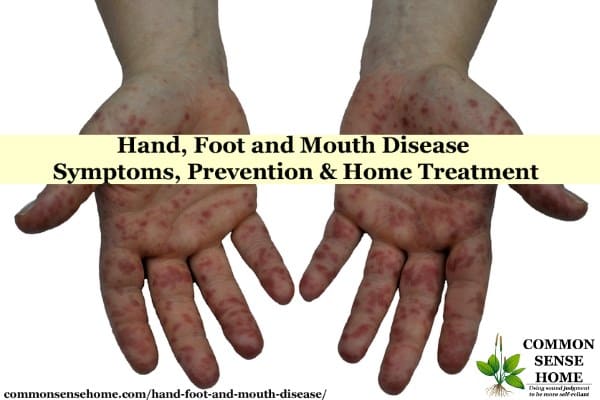
Hand, Foot and Mouth Disease – Symptoms, Prevention and Home Treatment
Hand, foot and mouth disease typically affects children 5 and under but colleges and hospitals across the country are reporting outbreak cases in adults. Dr. Christopher Houts of Powell Pediatric Care in Ohio said he’s “seen more cases this year than anytime in his 21 years as a pediatrician.” There is no cure or vaccine for this highly contagious and infectious disease. Something as simple as a handshake or breathing contaminated air can spread this disease from person to person.
What is hand foot and mouth disease (HFMD)?
From the CDC: Hand, foot, and mouth disease is a common viral illness that usually affects infants and children younger than 5 years old. However, it can sometimes occur in adults. A skin rash with red spots, and sometimes with blisters, may also develop over one or two days on the palms of the hands and soles of the feet; it may also appear on the knees, elbows, buttocks or genital area.
Who is at Risk?
While anyone can contract the disease, it usually affects children under the age of 5 who have not fully developed resistance to HFMD. Symptoms usually appear in stages, not all at once. Also, not everyone will get all of these symptoms. Some people may show no symptoms at all, but they can still pass the virus to others.
Symptoms of Hand, Foot and Mouth Disease
The symptoms of the hand, foot and mouth disease usually takes between 3 and 7 days to appear. This is called the incubation period. The disease lasts for around a week to 10 days and often resolves completely on its own without treatment.
Symptoms of hand, foot, and mouth disease often include the following:
From the CDC (Center for Disease Control)
- Fever – High fever as high as 104°F (40°C) may be seen in most children. The fevers are typical of viral illness with high and regularly timed peaks and resolution of temperature to normal between two peaks.
- Reduced Appetite – Like most viral illnesses children with HFMD experience loss of appetite.
- Sore Throat – On examination, the throat often shows red spots over the throat, tonsils, mouth and tongue. These may be painful and make swallowing difficult.
- Sores – Painful sores in the mouth that usually begin as flat red spots. After the initial day or two of the infection many children develop red spots in the mouth that progress to ulcers. These worsen and are present in the mouth, tongue, tonsils, over gums and insides of the cheeks and throat. These are extremely painful and make it difficult to eat, drink or swallow. The ulcers typically appear yellow with red halos around them. Children aged under 5 years tend to have worse symptoms than older children
- Rash – A rash of flat red spots that may blister on the palms of the hands, soles of the feet, and sometimes the knees, elbows, buttocks, and/or genital area.
Prevention of Hand, Foot and Mouth Disease
Like with most diseases or illnesses, good hygiene can help prevent the spread of HFMD. An ounce of prevention is worth a pound of cure! You can decrease your chance of contracting this disease with a few precautionary measures.
- Wash hands thoroughly and often – I cannot stress this enough.
- Wash or wipe down all diaper changing areas before and after you change your child.
- Keep door handles and doorknobs cleaned, including kitchen cabinets pulls – *Note – copper door pulls have been shown to decrease disease transmission
- Clean toys in hot soapy water, especially after play dates
- Wipe down grocery carts or bring your own cart cover
- Don’t share eating utensils
- Change clothes as soon as you get home (this can help prevent other illnesses as well)
- Avoid skin to skin contact with anyone infected with HFMD
- Work on building your immune system
- Take a daily probiotic or enjoy live culture foods
- Get enough sun exposure each day (Vitamin D)
- Eat nutrient-dense food and foods high in antioxidants
- Drink bone broth daily
- Eat garlic
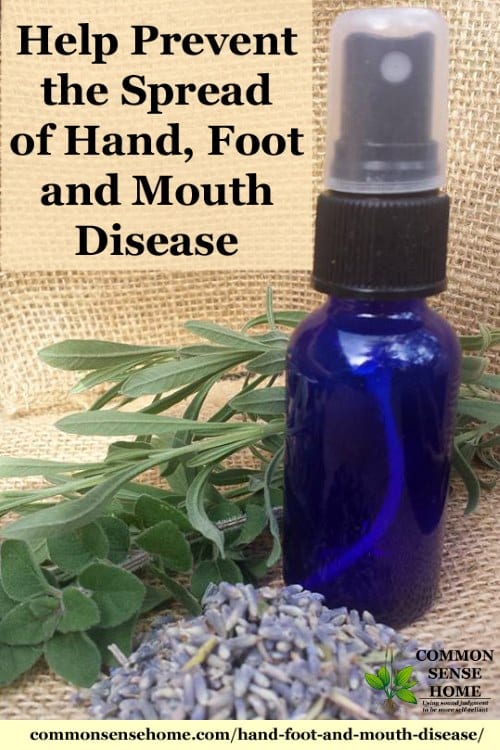
Antibacterial Spray to Help Prevent the Spread of Hand, Foot and Mouth Disease
The FDA has recently banned the toxic ingredient (Triclosan) from commercial use, but it remains to be the active ingredient in many antibacterial soaps, cleaners and hand sanitizers. You can avoid commercial hand sanitizers and make your own all-natural, non-toxic Antibacterial Spray instead.
Ingredients
- Probiotic Capsule
- Witch Hazel 8oz
- Thyme or Oregano (small handful about 2oz)
- 4 Lavender Stems or 3 Tbsp. flowers
Directions
- Place herbs and cover with witch hazel in a glass container and let sit for 2 or more weeks, shaking occasionally.
- Strain herbs and put the herb-infused witch hazel a glass spray bottle.
- Add capsule of probiotic powder, shake to mix.
- Label your bottle with Antibacterial Spray and include the date.
- Use your Antibacterial Spray on car handles, shopping carts, toys, doorknobs, public diaper changing stations, gas stations, whenever you can’t wash your hands and need an antibacterial spray etc.
Antibacterial Spray Ingredient Overview
Lavender – Lavender oil is believed to have antiseptic and anti-inflammatory properties which can be used to help heal minor burns and bug bites. A study published in the Journal of Medical Microbiology found that lavender oil could be very effective in combating the incidence of antifungal-resistant infections.
Thyme – The volatile essential oils in thyme are packed with anti-septic, anti-viral, anti-rheumatic, anti-parasitic and antifungal properties. Thyme oil demonstrated a good efficacy against antibiotics resistant strains of the tested bacteria
Probiotics – Living microorganisms on the skin are recognized as foreign by the body’s immune system. The immune system springs into action to counter this potential threat resulting in the inflammation, redness, or bumps common in these skin conditions.
Probiotics applied topically sit on the skin’s surface and prevent the skin cells from seeing the bad bacteria and parasites that can cause this immune system response. This is known as “bacterial interference,” as probiotics protect the skin and interfere with the ability of bad bugs (or bacteria and parasites) to provoke an immune reaction.
Witch Hazel – Witch Hazel has been used for its properties as an astringent for centuries. The composition of witch hazel mainly includes calcium oxalate, gallotannins and safrole. Witch hazel also contains some essential oils like carvacrol and eugenol that are the main reason for its cosmetic properties. The pH of witch hazel is between 3.0 and 5.0 (acidic pH). Antioxidants like flavonoids are also present in witch hazel. Tannis is the main chemical compound that imparts astringent properties in witch hazel.
Home Remedies for Hand Foot and Mouth Symptoms
While hand, foot and mouth disease normally resolves without treatment, the symptoms can be very uncomfortable, especially for small children.
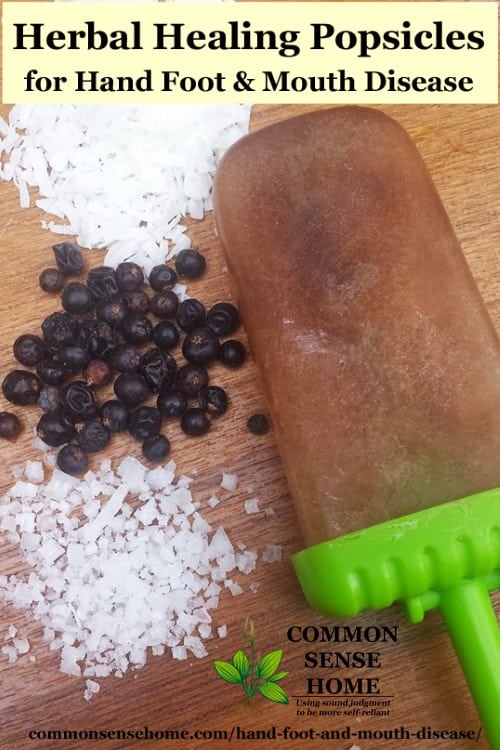
#1 – Herbal Healing Popsicles
One of the main concerns with HFMD with children is dehydration. The sores can be painful and cause discomfort when eating. Make sure you keep plenty of hydrating liquids in your little one until their appetite returns.
Would you like to save this?
Ingredients
- ¼ Cup Elderberry Syrup (get the recipe)
- 8 oz of Coconut Water or Fruit Juice
- 1/8 tsp Sea Salt
Directions
Mix ingredients together and freeze into popsicles. If you don’t have popsicle molds, you can use paper cups and popsicle sticks.
Healing Popsicle Ingredient Overview
Coconut Water – A 2007 study shows coconut water enhanced with sodium was as good as drinking a commercial sports drink for post-exercise rehydration with better fluid tolerance. Another study reported that coconut water caused less nausea, fullness, and stomach upset and was easier to consume in large amounts during rehydration.
Elderberry – Elderberries contain flavonoids, are antioxidants, antiviral, anti-inflammatory, antiviral, anti-influenza, and anticancer properties. Chemicals in the berries help reduce swelling in mucous membranes and relieve nasal congestion.
Sea Salt – Sea salt contains more than 84 minerals and nutrients that our body needs and craves on a daily basis. It has been used throughout history for achieving and maintaining optimum health. By adding just a pinch of sea salt to a glass of water will blast these minerals and nutrients into your body. This satisfies your thirst longer because the mineral content holds more of the water within your body.
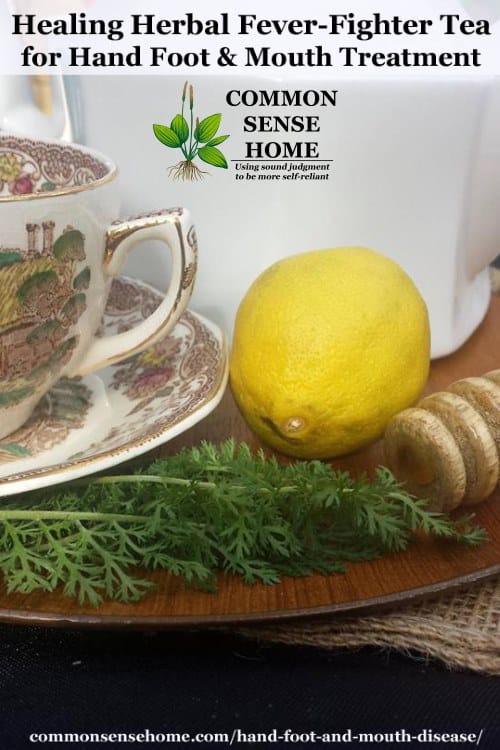
#2 – Healing Herbal Fever-Fighter Tea
Yarrow will help you get rid of a dry fever when taken as a hot infusion.
- 1 tsp of dried yarrow (or 3 leaves of fresh)
- 1 cup boiling water
- 2 tsp honey
- ½ tsp lemon
Bring water to a boil and pour over yarrow and let steep for 10 mins. Add honey and lemon, stir and drink.
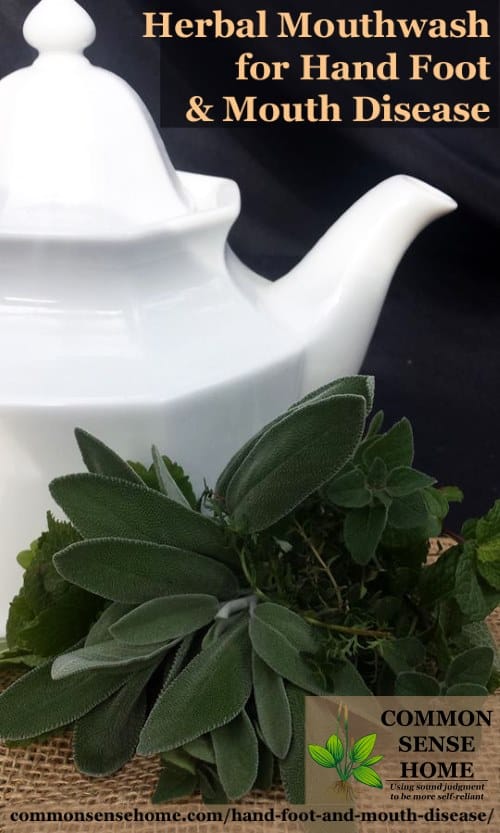
#3 – Herbal Mouthwash
Using an herbal tea infusion as a mouthwash will aide in healing and help relieve symptoms. You can also add raw honey if the child is over two years old to help with the taste for additional healing properties. Make herbal tea infusion and use as mouthwash several times a day.
Herbs to use for mouthwash:
How to make an herbal tea infusion:
- Boil 1 quart of water per ounce of herb (or 1 cup of water to 1 tablespoon of herb).
- Pour water over the herb(s) and let steep for 30 to 60 minutes.
- The proportion of water to herb and the required time to infuse varies greatly, depending on the herb.
- The more herb you use and the longer you let it steep, the stronger the brew.
#4 – Herbal Healing Salve
Use this herbal healing salve on external wounds or sores to promote healing and provide relief from discomfort.
Ingredients
- 4 oz of Oil (coconut, grapeseed, apricot, avocado, or other carrier oil of choice)
- 1 oz of beeswax
- 2 oz of herbs (see my suggested list below)
Directions
- In a crock pot or a double broiler, place the oil and herbs on the lowest setting for 1-4 hours.
- Next, strain herbs and add beeswax, stir until melted.
- Pour mixture into a glass container- let cool and place lid on top.
- Store in cool, dark place. Discard if oil becomes rancid (it will smell “off”).
Do you have a home remedy for hand, foot and mouth disease that worked for you? I would love for you to share it.
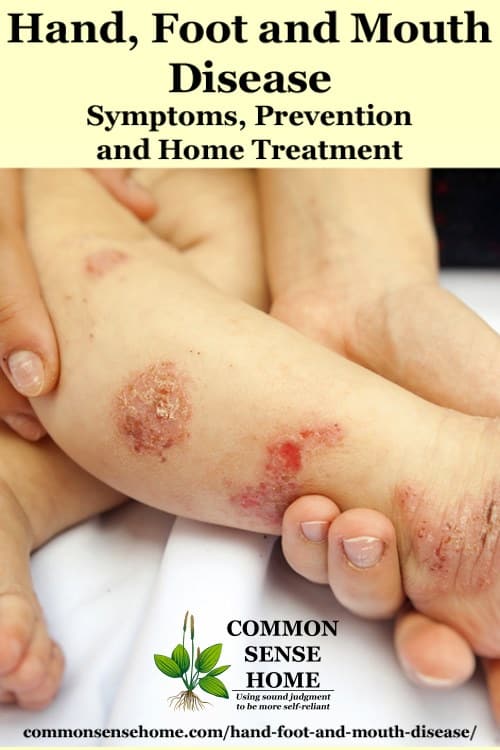

This post is by Amber Bradshaw of My Homestead Life.
Amber and her family moved from their tiny homestead by the ocean in South Carolina to forty-six acres in the Smoky Mountains in East Tennessee.
While building their off-the-grid homestead, they live like the days of old – cooking without electricity, collecting water from the creek and raising chickens, goats, pigs, turkeys, bees, and guineas. They’ve recently filmed their journey for a TV show on the Discovery Channel and the DIY Network/HGTV called Building Off The Grid: The Smokey Mountain Homestead.

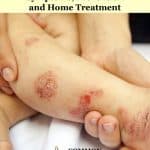


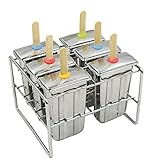
I made some breastmilk lotion. I used 4 oz. grapeseed oil and 1.5 TBSP yellow beeswax and used a double boiler to melt and combine both ingredients. I added 5-6 drops of Vitamin E oil. Take boiler off the heat and slowly added in 4 oz of freshly expressed breastmilk. Whisk until all ingredients are mixed thoroughly and become a lotion like consistency. It’s optional to add essential oils, I decided not to due to my daughter being sensitive to different scents. Store in air tight container in fridge for up to 3 months. So far it has made her rash/sores disappear a little!! I’ve even used this on my own skin! It’s like magic in a bottle.
Thanks for sharing your experience and recipe, Rachael.
Use apple cider vinegar drink and soak hands and feet also use sea salt. Eat garlic. Hope it helps
my wife has it and its been a year now. she uses clovetasol ointment and its no use still coming back. what remedies we should do? thank u
Are you sure it’s hand foot and mouth disease? If it’s lasted this long, it may well be something else, like candida overgrowth. It’s probably a good idea to get a professional diagnosis, or at least consider other possibilities. A couple years ago, my skin went nuts – red, patchy, itchy, flaky – over large areas of my body. The dermatologist said psoriasis, gave me some cream and told me to live with it. Thankfully I didn’t listen to her and did my own research. I found out I had an underlying candida overgrowth that was causing the psoriasis. Now, through a variety of home treatments including diet changes, supplements and other methods, my skin is once again clear. I ended up writing a series about the experience that starts here – https://commonsensehome.com/psoriasis-the-year-my-face-exploded/.
my son i think is suffering from this at the moment and what worry me the most is he is uncomfortable and wary to scratch it. what would be the best thing to soothe itchiness?he is only 2 years and 6 months. thanks
You could make up some of the salve listed in the post, or buy something ready made such as this Plantain Salve with Lavender. Oatmeal baths are also soothing to the skin and safe for young children.
hi laurie, grateful to your message but looking for the salve you are talking about is a challenge here in the philippines i was able to find CALMOSEPTINE i believe it is an imported brand. i pray for my baby’s fast recovery.
Calmoseptine has menthol. I wouldn’t recommend that for baby. It may make the itching worse.
I don’t know what’s readily available in the Phillipines. You can probably get coconut oil, yes? Coconut oil would be soothing and safe for baby.
You could also other local mothers for recommendations on baby safe products that are available in your area.
If thyme kills a lot of pathogens….is there evidence that thyme would kill the probiotics in the spray recipe?
Medical testing on herbs is very limited at best and almost impossible to find.
Unfriendly bacteria and pathogens reside on and in the body differently than friendly bacteria. In pure concentration of essential oils, herbs can kill both good and bad bacteria. However, they have created a more harmonious environment for good bacteria to survive.
In the dosage and strength I recommend I have strong doubts that the herbal constituents will kill enough of the good bacteria (probiotics) to make a negative impact.
I was able to locate this one small study showing some herbal oils allowing the good bacteria to live.
I hope this helps and thank you for your question.
http://www.curezone.org/forums/fm.asp?i=757185
Amber B
Could soaking your hands in Keefer help the healing process
I don’t think it would hurt in any way, and milk kefir in particular should be soothing at the very least.